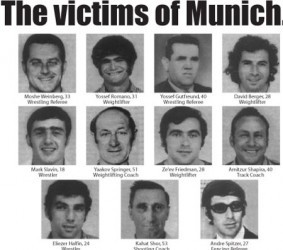 By now, they would be grandparents.
By now, they would be grandparents.
The 1972 Munich Olympics would have been one of the stories they told their grandchildren, a highlight from their youth. The details of their competition, the camaraderie of the team, perhaps even a return trip to the Olympics in 1976- all would have been the stuff of family lore.
In the early morning hours of Sept. 5, 1972, terrorists affiliated with the Palestinian group Black September gained easy entrance to the Olympic village, climbing a fence just over six feet high. They broke into the building housing the sleeping Israeli athletes and coaches, killing two Israelis and taking nine hostage. The terrorists (was that word even used forty years ago?) demanded the release of two hundred Palestinian prisoners held in Israeli jails and their own safe passage out of Germany.
The next day at the airport, a botched effort by German sharpshooters to kill the terrorists resulted in a chaotic gunfight in which all of the Israeli hostages were killed.
While the hostage situation played out, the Olympics went on as usual. After the massacre, the Olympics paused only one day before resuming.
“Incredibly, they’re going on with it,” Los Angeles Times columnist Jim Murray wrote. “It’s almost like having a dance at Dachau.”
Those actions were in sync with a world that, forty years ago, thought of Arab terrorism as simply the Israelis’ problem. That lesson was not lost on terrorists either. The Munich killers who survived the airport shootout were jailed in Germany, but set free within a month, when other terrorists hijacked a Lufthansa jet and demanded the prisoners’ release.
It would take decades for people to realize that terrorism is not just Israel’s problem.
For years, the families of the murdered Israeli athletes, led by Ankie Spitzer, widow of fencing coach Andrei Spitzer, have petitioned the International Olympic Committee (IOC) for a moment of silence to honor the memory of the murdered athletes. The IOC has steadfastly refused to do.
This year marks the 40th anniversary of the Munich massacre.
Leaders from Australia, Germany, Canada and the US have urged the IOC to include a moment of silence at the 2012 Games, which will take place in London in a few weeks. The U.S. Senate unanimously passed such a resolution. A similar resolution was passed by the House Foreign Affairs Committee. A grassroots movement for a moment of silence has brought attention to the issue through an online petition with over 88,000 signatures and a commemorative t-shirt.
Israel has reached out diplomatically to the IOC as well. In a letter to Jacques Rogge, president of the IOC, Deputy Foreign Minister Danny Ayalon wrote,
“The Olympic Games are a unique global event which transcends nations, peoples and boundaries and are meant to be a joyous event for all. However, for Israel and its people, each Summer Olympic Games also reminds us of the brutal murders which took place in the Munich Olympic Village during the summer of 1972.”
The IOC remains firm in its refusal. The Israeli Olympic Committee will hold a reception at London’s Guildhall to commemorate the slain athletes, which Rogge and other IOC officials plan to attend. But within the Olympic proceedings themselves, there will be…..nothing.
Says David Harris, Executive Director of the American Jewish Committee:
“The 11 victims in 1972 were Israeli, but the Palestinian terror attack in Munich was an assault on all who came to participate peacefully in the spirit of the Summer Olympics. The IOC refusal to hold a moment of silence during the London games opening ceremony, which will be watched worldwide, is simply shameful. How else can we interpret the IOC stance decision but as political in what is meant to be a non-political movement?”
However one interprets the refusal – including the belief that a moment of silence would anger some Arab participants, or that it would be a stark reminder of the long-running Israeli-Palestinian dispute – the refusal itself demonstrates that one of the essential lessons of the Munich massacre, perhaps the central lesson, has yet to be learned. And it is this:
Evil perpetrated on the Jews never ends with just the Jews. Terrorism for political ends is a now worldwide scourge.
What nation among all those gathered for the Olympics has not felt its effects?
And that is why a moment of silence at the Olympics, shared by athletes from around the globe and seen by a worldwide audience, is so important. The gesture is a simple but powerful demonstration of solidarity against terrorism. And its omission, for whatever reason, sends a powerful message too.

